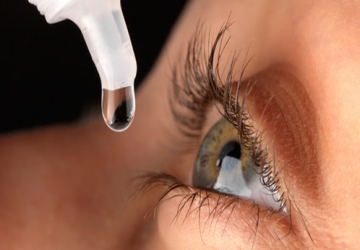
Eye drops
The eye drops are usually the basis of a salt liquid, and the eye drops help to provide the necessary moisture to the eyes or they can be used for purely medicinal and therapeutic purposes.
With the question of Dr. Muhammad Hantira, Honorary Assistant, Ophthalmology Department, Umm Al-Qura University, Saudi Arabia, he explained to us a number of drops used in the field of ophthalmology.
Types of eye drops
Different types of eye drops are sold in pharmacies without the need for a specific prescription to buy them, and these are the most important types that you will encounter in the pharmacy and how to choose the best one for your case:
1- The drops are of the type of artificial tears
This type of eye drops provides the moisture dry eyes need, so they are called tears, because they do the job of tears.
But you should pay attention and consult your pharmacist or doctor when choosing these drops, because some of them contain preservatives that may make your eye problem worse.
Stop use and consult a doctor if you experience any of the following:
• Feeling of discomfort in the eyes.
• You need to use the drops more than 4-6 times a day.
• The severity of your dry eyes.
2- Eye drops for allergies
This type of eye drops is usually used by allergy sufferers, to relieve the feeling of itching and redness and to relieve watery eyes.
Usually, the main ingredient for this type of drops is antihistamines, which alleviate the annoying allergy symptoms.
3- Anti-redness eye drops
This type of drops helps relieve any congestion and redness in the eyes, but you should be careful when using this type of drops for the following reasons:
• Using it for a period of more than several days may cause the problem of red eyes to worsen.
• Using it for long periods of time may make the eyes accustomed to it and need it permanently.
• Different uses of eye drops
Eye drops are usually used in the following cases:
• Cataract surgery procedure: Certain drops are used before the operation to protect the eye from infections and afterwards, to speed up the healing of the eye.
• Pink eye: Eye drops help to combat the inflammation that causes it, and it is possible here to use antibiotics in the form of eye drops.
• For the purpose of moisturizing contact lenses: Contact lenses can cause dry eyes, and here eye drops help to moisturize them and combat this dryness.
• Keratitis: The drops help fight any inflammation of the cornea.
• Corneal transplant procedure: The doctor prescribes here drops that are used after the operation to speed up healing and prevent infection.
• Dry eyes: With age, the chances of experiencing dry eyes increase. Eye drops here can help restore moisture to dry eyes.
• Other cases:
Having an allergy.
Undergo an ophthalmological examination.
Glaucoma.
Perform laser vision correction.
Dr. Hantira explained:
Rules for the proper use of eye drops
When using eye drops, you must make sure to follow the following rules:
Make sure the drops have been tightly closed and in their packaging intact before using them.
• Never leave the device used for instillation in contact with the eye. Keep a slight distance when instilling.
• Tilt your head back, open your eyes well and spread the lower eyelid slightly with your finger, then drip into the space between your lower eyelid and the eyeball.
• Close your eyes for 5 seconds.
• If you use contact lenses, you have to wait at least 10 minutes after instillation, after which you can only put the lenses in (some types of eye drops may not work with contact lenses, so consult a doctor first).
• If you use more than one type of eye drops, do not use them directly without an interval. Rather, use the first type, and then wait a period of at least 5 minutes before using the second type.
• When using eye drops, be sure to adhere to all the instructions and rules stated on the package or that your doctor told you.
• Stop using eye drops when your doctor advises you to do so.
When should you consult a doctor?
Sometimes dry or red eyes may not constitute any serious health problems that require intensive medical attention, but, in a few cases, a doctor may be required, such as:
There is no improvement despite regular use of eye drops.
Eye problems get worse with eye drops.